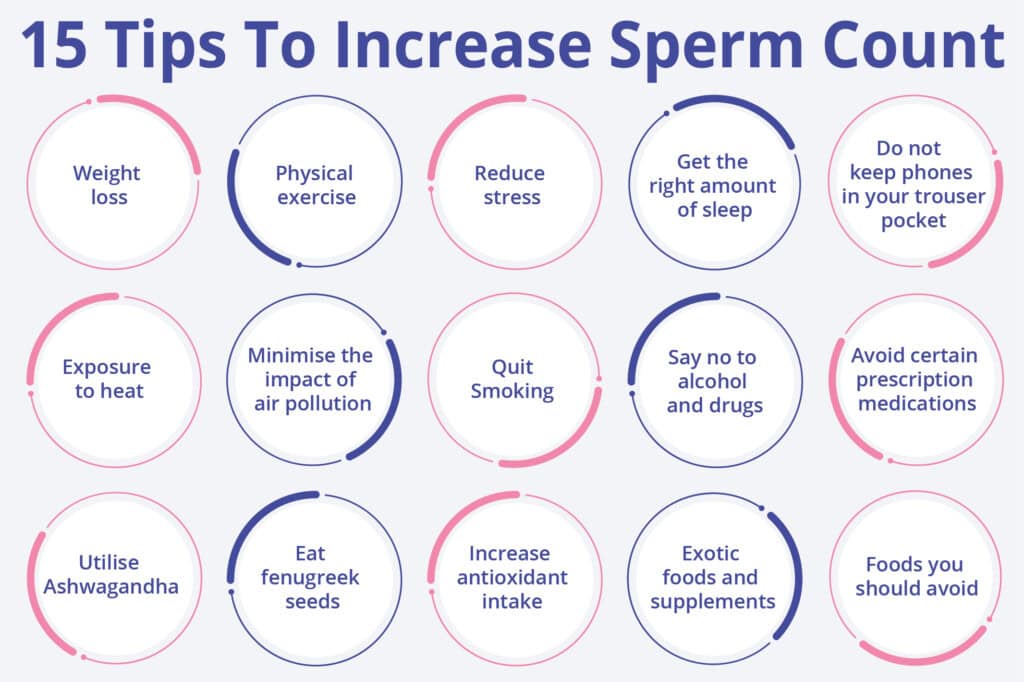Top 15 Tips on How To Increase Sperm Count
- Published on November 01, 2021

If having a low sperm count is one of your worries, you are not alone. Studies have found that the average sperm count has been decreasing universally in the male population though doctors have not been able to pinpoint why. On the bright side, there are multiple ways, and in this article, Dr. Vivek P Kakkad, head of medical services at Birla Fertility & IVF, will discuss different things related to how to increase sperm count, like food to increase sperm count naturally and how to improve sperm motility.
Table of Contents
What is a Low Sperm Count?
Low sperm count (oligospermia) is one of the main reasons for male infertility. The World Health Organisation defines low sperm count as the presence of fewer than 15 million sperms/ml of semen or fewer than 39 million sperms/ejaculate.
As a thumb rule, it recommends getting yourself checked for infertility by a trusted doctor if there is no conception after one year of having regular unprotected sexual intercourse.
A male could also get checked if there is
- a lack of sexual desire
- issues with sexual stimulation or ejaculation
- pain or swelling in the testes or groin
While low sperm count could be an indicator of male infertility, a few other factors related to semen have a direct influence on fertility.
- Concentration – the amount of sperm in semen
- Motility – the ability of sperm to swim and reach the egg
- Structure – ideal shape for a sperm
- Volume – the amount of semen per ejaculate
Also, read ivf kya hai
Ways to Improve Sperm Count

Let us look at lifestyle changes and dietary habits that could help to improve sperm count and quality, directly improving the chances of extending your family.
- Weight loss
Shedding those few extra kilograms has been proven to increase semen volume, sperm count and motility. If you have always wanted to lose some weight, this finding gives you more reason to do so.
- Physical exercise
If weight loss is something that you cannot pursue, spending time to keep yourself physically fit by engaging in physical exercise at regular intervals is one way to improve sperm count.
- Reduce stress
A study conducted in Europe shows that high-stress levels were related to lower semen volume, sperm count and sperm health. Men who admitted to having high levels of stress in their daily lives are most severely affected. Take a chill pill. Calm down and let life take its course.
- Get the right amount of sleep
Excess sleep or extreme lack of sleep may affect semen quality. According to one published study, an average night’s sleep of 7-7.5 hours would be the optimal amount.
- Do not keep phones in your trouser pocket
Long term exposure to electromagnetic radiation from mobile phones can decrease the number of healthy sperms in your testes. Prolonged exposure might also cause genetic defects in the sperm. Keep your phone in your pocket only when necessary. A simple lifestyle change could go a long way in curing infertility.
- Exposure to heat
Frequent exposure to higher temperatures can decrease sperm count. The testes operate efficiently when slightly lower than the body temperature. By habit, you might unwittingly increase the heat directed at your groin area. Two common examples of such habits are wearing tight lower garments and laptop usage.
Tight underwear or pants tend to increase the temperature in your groin area and can adversely impact sperm production.
Though they are named laptops, using these devices by placing them on your lap for long hours is not advisable. Like the usage of tight garments, laptops too increase the temperature in your tests.
If your daily job involves exposure to heat for a long time, it could be a direct cause of low sperm count and infertility.
- Minimise the Impact of Air Pollution
Total sperm count is much lower in males living in severely polluted industrial areas comparing males living in lesser polluted areas. If you do not have the luxury of relocating to a cleaner environment, wearing masks could minimise the impact of air pollution on infertility.
- Quit Smoking
One of the wider trends in this generation, the prevalence of smoking has been rising off late. Cigarette smoking harms several semen parameters. Stubbing the butt could not just improve your lung capacity but also help in improving your sperm quantity.
- Say no to Alcohol and Drugs
One of the most widespread titbits of information is that excessive drinking of alcohol lowers sperm count. This is not a myth and has been backed up by research studies, with results confirming that too much alcohol decreases sperm count.
Anabolic steroids and recreational drugs like marijuana, when used at extreme levels affect your reproductive health. If you are a drug user and are having problems with fertility, you should stop this habit at once to improve your chances of becoming a parent.
- Avoid Certain Prescription Medications
If you have been taking regular medications for any other medical condition, consult a qualified doctor and discuss whether these medicines could have any impact on your sperm count or affect your fertility.
The medicines listed below can inhibit healthy sperm generation, but normal sperm production should resume once these medications have been stopped.
- antibiotics
- anti-androgens
- antidepressants
- anti-inflammatories and
- artificial testosterone
- Utilise Ashwagandha
An age-old Indian tradition and Ayurvedic medicine, Ashwagandha is an aphrodisiac. It is known to increase semen volume and sperm motility. Additionally, it is also believed to cure infertility and sexual dysfunction. An all-in-one solution.
- Eat fenugreek Seeds
Extracts from fenugreek seeds (Methi) are a safe way to boost testosterone levels. Testosterone is directly linked to fertility and can help increase the quality and quantity of sperms, while also improving cardiovascular health and mental alertness.
- Increase Antioxidant Intake
Antioxidants actively remove potentially damaging oxidising agents inside the body. More antioxidants will help the human body to function much more effectively and remove toxic substances from the body.
Vitamin C and Zinc are common antioxidants. Vitamin C increases all factors of sperm quality and improves the chances of conception. Poor Zinc nutrition may be an important risk factor for low-quality sperm and male infertility, so have a healthy dose of Zinc in your diet.
This is a list of foods rich in Vitamin C and Zinc. Try to include them in your diet.
- Citrus fruits like lemon, orange
- Green leafy vegetables like broccoli
- Dark chocolate
- Pumpkin and sesame seeds
- Exotic Foods and Supplements You Should Include in Your Diet
Though not common in Indian cuisine and culture, listed below are some foods widely available and have proven results to increase sperm count and quality.
- Walnuts
- Maca roots
- Folate-rich foods
- D-aspartate Amino Acid
- Omega-3 fatty acids
- Foods rich in Vitamin D
- Foods You Should Avoid
A balanced diet has been a commonly advised cure for infertility and there are a few food items that increase chances of infertility. If it is not possible to avoid these foods, minimise the proportion of these items in your diet.
- Soy-based foods
- Full-fat dairy foods
- Foods high in trans fatty acid
Summary
Low sperm count is a problem plaguing a large number of people across the globe. Try to switch healthy lifestyles to improve chances of better sperm quality and quantity. You can also try to change your diet by increasing antioxidant-rich foods and avoiding a few sperm inhibitors.
“Be the change you wish to see”
Most of the methods suggested above can be incorporated into your life without much difficulty and it is on you to make these subtle changes to your life to improve your chances of becoming a father.
Making attempts to increase sperm count before opting for IUI or IVF will improve the chances of fertilisation and pregnancy. But the first step would be to talk to a trusted doctor who will guide you to the right treatment method and put you on your way to becoming a parent. For more information, book your appointment or call +91 124 4882222.
FAQs:
- What Increases Sperm Count?
Most research suggests that lifestyle changes, dietary modifications, and natural remedies help manage and improve a low sperm count. These lifestyle changes involve regular exercise, a proper sleep cycle, avoiding excess alcohol intake, tobacco use, and prohibited drugs.
You can also take herbal supplements, like ashwagandha and fenugreek, to increase sperm count naturally.
- How to Increase Sperm Count Fast?
For increasing sperm count, one should develop a healthy lifestyle, maintain healthy habits, and eat healthily. You can add some of the following tips to boost sperm count naturally;
- Intake of D-aspartic acid supplements
- Regular exercising
- Intake of vitamin C
- Intake of vitamin D
- Intake of zinc
- Taking less stress
- Add fenugreek supplements to your diet
- Add maca root supplements to your diet (helps in improving libido)
- How Many Days are Required to Increase Sperm Count?
There is no specific time to increase sperm count, it all depends on one’s healthy lifestyle. Better the lifestyle and dietary habits, the more the chances of increasing sperm count.
- Does Drinking Water Increase Sperm Count?
Well, taking enough water keeps you hydrated throughout the day and is also an important part of a healthy lifestyle. Taking adequate water may maximize the sperm count, but this ‘increase in sperm count’ will also be within normal limits.
Related Posts
Written by:
Dr. Vivek P Kakkad
Consultant
With over 10 years of clinical experience, Dr. Vivek P. Kakkad is an expert in the field of reproductive medicine and surgery. With a strong focus on providing patient-centric and compassionate care, he is also a trained professional in Andrology from a globally renowned university. He has also secured one of the top 3 positions in AIIMS DM Reproductive Medicine and achieved All India rank 14 in NEET-SS.
Ahmedabad, Gujrat
Our Services
Fertility Treatments
Problems with fertility are both emotionally and medically challenging. At Birla Fertility & IVF, we focus on providing you with supportive, personalized care at every step of your journey towards becoming a parent.Male Infertility
Male factor infertility accounts for almost 40%-50% of all infertility cases. Decreased sperm function can be the result of genetic, lifestyle, medical or environmental factors. Fortunately, most causes of male factor infertility can be easily diagnosed and treated.We offer a comprehensive range of sperm retrieval procedures and treatments for couples with male factor infertility or sexual dysfunction.




































